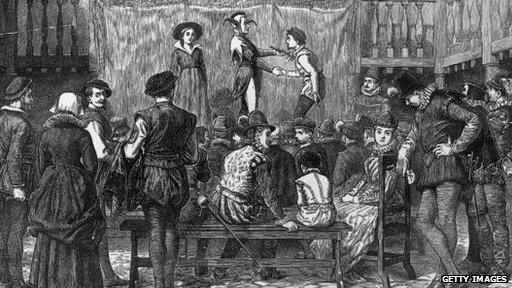Autumn Statement 2014: Business rates reform demanded
- Published

The system of business rates dates back to Shakespeare's time
While many of you may be starting to think about what to put on your Christmas wish list, business groups have completed theirs - and submitted them to the chancellor ahead of this year's Autumn Statement.
The priority for most of them is reform of business rates - a type of tax that is calculated according to the rental value of the property a business uses, and which dates back to the Poor Law established in 1601.
The complaint is that business rates are completely out of date and need a total overhaul.
For instance, in the age of the internet, businesses ask why should a company tax be based on the physical space it uses?
So, for example, Harrods and the online retailer Asos both have similar turnovers, of £716.3m and £769.4m respectively, but Harrods faces a business rates bill of £11.5m in 2014-15, while Asos is set to pay £935,000.
That's because their properties have very different "rateable values", external, worked out according to postcode and size. Based on a valuation date from 2008, Harrods was three times the size of the Asos property and is based in the affluent area of Knightsbridge, central London, while the Asos distribution centre is based in Grimethorpe, Barnsley.
'Prohibitive'
Not only that, some companies argue that the rate is so high, it hampers growth and expansion in the UK.
"We pay 10 times more than our nearest plant in Europe," says Helen Foord from the car manufacturer GM UK, and one of the companies that has written to the chancellor asking him to change the law.
Ms Foord says the way they are calculated at the moment doesn't incentivise investment - in fact quite the reverse.
"Our plant and machinery is counted towards our hypothetical rental value, so when we invest in our plant and machinery to improve productivity... our business rates go up."
Not surprisingly, the company wants plant and machinery removed from the current system.

The cost of business rates is hindering expansion, says Supergroup
The clothes retailer Supergroup was also among the signatories of the letter to the chancellor.
It has warned that if the rate doesn't come down, it will look at expanding its stores abroad instead of in the UK.
"It is prohibitive in certain parts of the country where we would like to open and it means that our attentions will focus more on the international business," Supergroup founder Julian Dunkerton has said., external
"We would love to open more stores in the UK, but there are some places where the business rates are so high it just doesn't make sense."

What are business rates?
Date back to 1601 Poor Law
Calculated every five years according to rental value of property
Often a firm's third biggest outgoing, after wages and rent
Plant and machinery is taken into account where it is considered to be an integral part of the property
Money is used to pay for local services (fire brigade, police, infrastructure) - £26.9bn raised this year
The UK has the highest rates of any EU member state
Estimate your rates here, external (external site)

This is an issue that is uniting business across the board and across the UK.
The British Retail Consortium (BRC), the manufacturing organisation EEF, the business lobby group the CBI, the Federation of Small Businesses (FSB) and the British Property Federation (BPF) have all called on the chancellor to make the system "fit for purpose".
"Unlike every other tax in the UK, the business rates burden does not fluctuate with the economic cycle, meaning businesses have to pay the same regardless of economic conditions and this, we argue, must change," says Liz Peace, chief executive of the BPF.
Annual calculations?
The business rates campaigner Paul Turner-Mitchell argues that for smaller businesses it should be abolished altogether.
He argues that of the 1.7 million commercial properties on which business rates are paid, about one million are small businesses, but if you exempted them, that would only reduce the government's tax take from business rates by 6%.
Once you take out the costs of collecting those taxes, the government would still raise roughly the same amount of money, he calculates.
In addition, he suggests that the rate should be calculated annually and not every five years as it is at the moment.
This would be more responsive to the economic cycle, and not leave businesses paying rates on valuations that are years out of date, something that hit many businesses hard after the financial crisis.
In defence of the tax, Charles Baden-Fuller, centenary professor of business strategy at City University, points out that it is easy to collect and the compliance cost is low.
"All taxes are unfair," he says, "but this is not nearly as unfair as other taxes because large companies can't get round it. It is an efficient tax to collect."
However, the idea of change does appear to be gaining traction - MPs on the Business Select Committee are calling for wholesale review.
In last year's Autumn Statement a temporary rate relief was introduced and the government has started a review of the issue.
"Our business rates review is considering options for longer-term administrative reform of business rates that balance the need for the system to deliver simplicity, fairness, stability and predictability to ratepayers," Local Government Minister Kris Hopkins says.
However, the FSB says the review is limited and that something more radical is urgently needed.